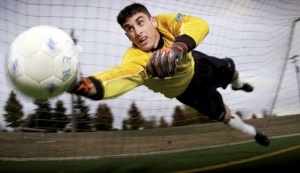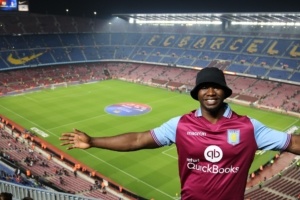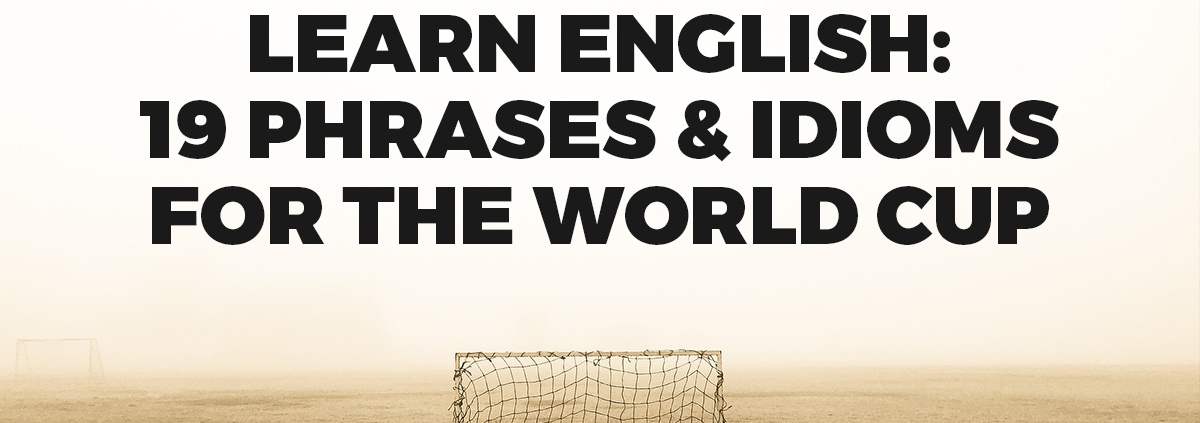Like football? Learning English?
If so, here are 19 football phrases and idioms related to the FIFA World Cup 2018 and football in general. This will improve your football-related vocabulary and you’ll also learn some important grammar.
Let’s get started!
(Note: In certain countries, it’s called soccer. But for this lesson, we’ll call it football.)
1: I hope England win(s)
We use hope to talk about desired outcomes in the future. I’m from England and, therefore, I want them to win. In British English, we talk about teams in the plural. In American English, we talk about teams in the singular.
- I hope England win (British)
- I hope England wins (American)
More examples:
- I hope Kane scores today
- I hope it’s a good game
- I hope the game’s on TV
Learn more about the difference between hope and wish here.
2: They Should Win
This means that you expect that they will win the game. They are the favorites (the better team).
More examples:
- Argentina should beat Nigeria
- This should be a good game
- Sane should be in the Germany squad
3: They Should Have Won
This is the same as number two, however, it’s used to talk about the past.
Here is another example:
He should have saved it.
Learn more about should have here or watch the video lesson below.
4: I wish he had saved it
This means that I want to change the past. He didn’t save it but I wish that were different. I wish he had saved it.
More examples:
- I wish the U.S. had qualified
- I wish I could go to the World Cup (future situation – I can’t go but I wish I could)
Pay attention to the difference between these sentences and the ones that use hope.
5: Argentina have had a man sent off
To have someone sent off = a player receives a red card and now the team is playing with ten men. We use the present perfect tense to describe this while the game is still ongoing.
But after the game is over, you’ll hear: Argentina had a man sent off. More examples:
- He should have been sent off
- Someone is going to be sent off soon
- He always gets sent off in major tournaments
6: If he hadn’t been sent off, Argentina would have won
This is an example of the third conditional. It talks about a different outcome in the past if something else were different.
This is a fun one to use and a lot of football fans like to talk about the past! More examples:
- If Croatia had won, they would have gone through (to the next stage)
- He would have scored if Messi had passed it to him
Here are more examples of the third conditional:
7: England beat Tunisia
This is something that I hope happens. Notice the sentence structure? We don’t need any articles or prepositions when we use the verb beat:
- I think Germany will beat Ecuador
- Come on, Spain. Let’s beat Italy!
- Do you think Iceland will beat Russia?
8: England lost to Tunisia
I hope this doesn’t happen! When we use the verb to lose, we use the preposition to:
- We’ll definitely lose to a good team soon
- I can’t believe Russia lost to Senegal!
When you only include one team in the phrase, this is how to do it:
- England lost
- Germany won
- Portugal drew
9: When does the match kick off?
You can also say: when does the match start?
- I can’t wait for kick off
- Did I miss the start of the match?
- Hurry up, it’s about to kick off!
(Note: It’s about to kick off can also mean that the game is about to get violent or that someone might start a fight.)
10: Messi’s amazing at dribbling
To be amazing at something means that you’re very good at something. Notice that we use the preposition at here.
- He’s so good at shooting
- He used to be good at tackling but he can’t do it these days
- If you keep practicing, you’ll be amazing at passing
We can also use this structure:
- Messi’s such a good dribbler
- He used to be a good tackler
11: What a save!

What a save!
This is a great one to know. We use this when something incredible happens. More examples:
- What a goal!
- What a pass!
- What a free kick!
12: It’s a full house

There’s not an empty seat
This means that there aren’t any available seats in the stadium. The stadium is full. You’ll also hear:
- There’s not an empty seat in the house
- The stadium is packed
- The stadium is full
13: It sounds like an amazing atmosphere
Football fans often sing songs and make a lot of noise. When you say it sounds like an amazing atmosphere this means that, although you’re not there, you can tell that there is a lot of noise in the stadium. You make an assumption based on what you hear through the television.
More examples:
- what an atmosphere!
- the atmosphere is a little dead today
- the atmosphere at soccer stadiums in England is amazing
14: They look tired
This is an assumption based on what you see. The players look tired. If the players look really tired, you can say: they look dead on their feet.
- the stadium looks empty
- he looks like a good player
- he looks out of shape (not physically fit)
15: We’re throwing a party for the World Cup Final

Popcorn is great for football parties
In the U.S., Super Bowl parties are very common. In the U.K., World Cup parties are common too. This is where a group of friends watches the game together while eating and drinking. To throw a party means to have a party.
- should we throw a party for the final?
- Dave’s having a party for the World Cup Final. Should we go?
- what a great party!
16: I’m so excited about the game

He’s excited about the game
This is a great way to express your excitement. Adding so makes it stronger. You can also say I’m really excited about the game.
There other ways you can say this:
- I’m really looking forward to the game (fairly strong)
- I can’t wait for the game (very strong)
- I was looking forward to this game but it’s not very good
17: We need to get stuck in!
This is a great idiom. To get stuck in means to tackle hard to get the ball. If a team gets stuck in, they show desire and determination when they don’t have possession of the ball.
- Come on, England, get stuck in
- They’re just not getting stuck in
18: They want it more than we do

determination
This is a great phrase. To want it means that you are determined to win. If a team wants it more than you do it means that they are more determined to win.
- you have to want it
- how much do you want it?
- they wanted it more
If a team is getting stuck in it shows they want it. Think about this in regards to learning English: how much do you want it? How much do you want to get fluent?
19: That’s one of the best goals I’ve ever seen
This is another example of the present perfect with the adverb ever. Using it in the present perfect means that this is one of the best goals I’ve seen in my life until now. I might see a better goal in the future.
- Spain was one of the best teams I’ve ever seen
- He’s the best player I’ve ever seen
- Who is the best player you’ve ever seen live (inside a stadium not on TV)?









